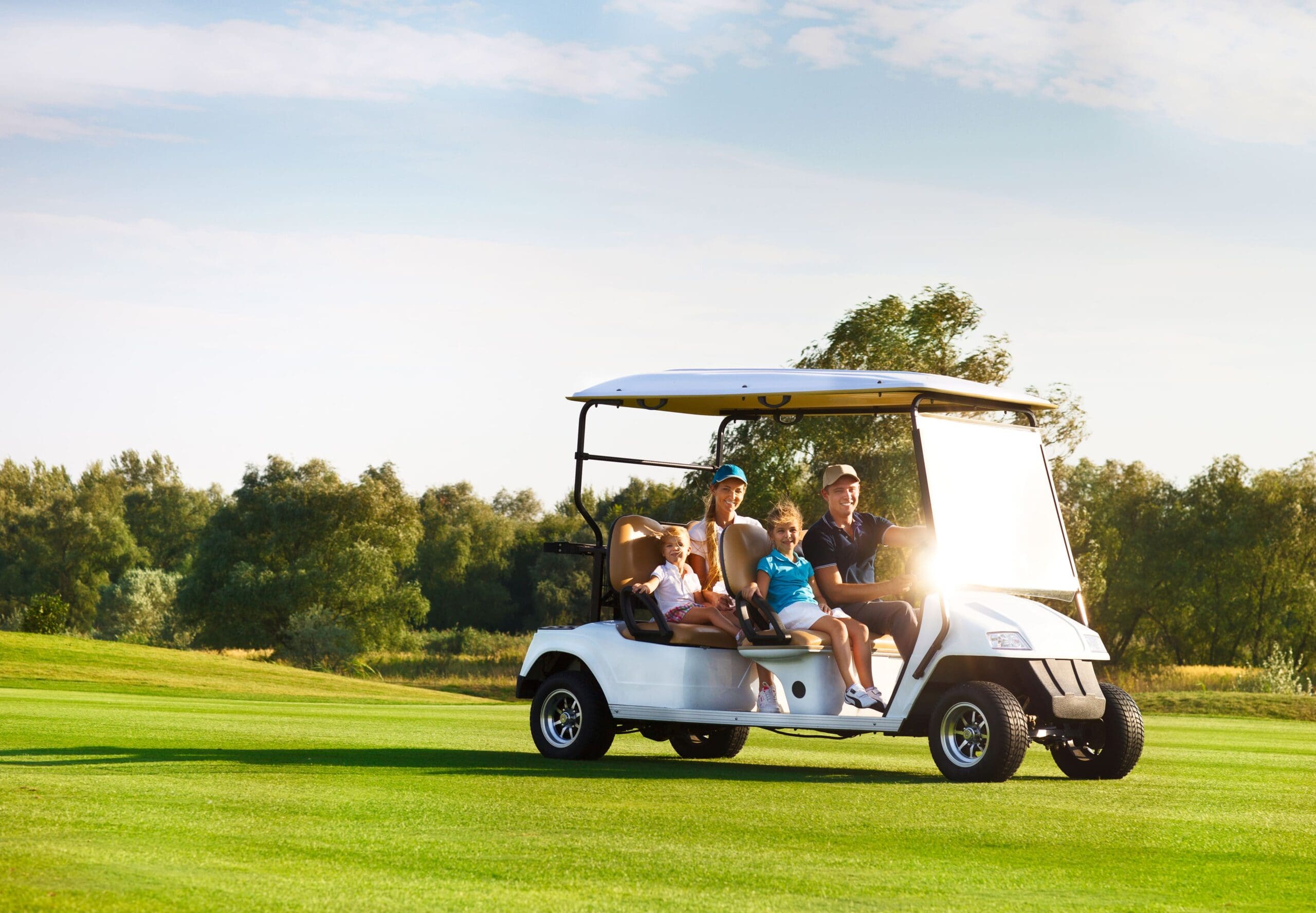Do You Need a License to Drive a Golf Cart?

Golf carts are popping up more often outside of golf courses. You’ll see them in neighborhoods, parks, resorts, and even on public roads. But are they treated like regular cars? Do you need a license to drive one?
The answer depends on where you are. In this post, Munley Law personal injury experts explain the laws in Pennsylvania, New York, New Jersey, and Delaware so you can ride legally and safely.
What Is a Golf Cart vs. a Low-Speed Vehicle?
Before diving into laws, it helps to know the difference between a golf cart and a low-speed vehicle (LSV):
- Golf Cart: Designed for the golf course. Top speed is usually under 20 mph. Most don’t have seat belts, turn signals, or other required road features.
- LSV: Similar size and shape to golf carts but faster — up to 25 mph. They must have features like headlights, turn signals, mirrors, seat belts, and windshields. They can be registered for road use.
Some states allow golf carts on the road only if they’ve been upgraded to meet LSV standards.
Do You Need a Driver’s License? Requirements in PA, NY, NJ, and DE
Pennsylvania
Yes. Pennsylvania treats LSVs as Class C vehicles, meaning you must have a valid driver’s license. Golf carts not upgraded to LSV status are generally not allowed on public roads.
New York
Yes. Like Pennsylvania, New York requires a valid driver’s license for any LSV driven on public roads. Golf carts are banned from road use unless they’re classified and registered as LSVs.
New Jersey
Yes. New Jersey requires a driver’s license for all low-speed vehicles operated on public roads. Golf carts, if not upgraded, are only allowed on private property.
Delaware
Yes. Delaware considers golf carts and LSVs as “off-highway vehicles.” They must meet specific equipment standards and be operated by licensed drivers on public roads.
No matter which of the four states you’re in, you must have a driver’s license to drive a golf cart on public roads.
Age Requirements to Drive a Golf Cart
Each state sets its own rules for how old you must be to drive.
- Pennsylvania: 16 years old with a valid license for LSVs. No public road use for standard golf carts.
- New York: 16 years old and licensed for road use. On private property, local laws may allow younger drivers.
- New Jersey: At least 16 and licensed. Some private communities may allow supervised minors.
- Delaware: Minimum age is 16, and you must have a valid license.
On private property, like farms or golf courses, younger individuals may be allowed to drive. But always check local ordinances and community rules.
Where Can You Drive a Golf Cart?
This varies by location and road type.
- Public Roads: Generally, golf carts are not street legal unless they’re upgraded to meet LSV standards and driven in areas with posted speed limits of 25–35 mph.
- Neighborhoods and Communities: Some gated communities and resorts allow golf carts on private roads. Rules can vary, so ask your homeowners’ association or management team.
- Golf Courses and Private Land: Most places allow use here without restrictions.
Is Registration Required?
- Pennsylvania: Yes, for LSVs. They must be titled and registered with PennDOT.
- New York: Yes, all LSVs used on public roads must be registered and insured.
- New Jersey: Yes, the Motor Vehicle Commission requires registration for any LSV used on public streets.
- Delaware: LSVs must be registered and inspected to make sure they meet safety standards.
Standard golf carts (under 20 mph, no upgrades) typically cannot be registered for road use.
Do You Need Insurance?
Yes. If your cart is classified as an LSV and used on public roads, you’ll need liability insurance at a minimum in all four states. Some insurers offer specialized golf cart or LSV coverage, especially for recreational or seasonal use.
Safety Matters
Golf carts may look simple, but accidents happen. Between 1990 and 2006, more than 147,000 golf cart injuries were treated in U.S. emergency rooms. Of those, over 30% involved children under 16. More recent data from the U.S. Consumer Product Safety Commission reports that over 13,000 golf cart injuries occur every year in the U.S.
To stay safe:
- Wear seat belts if available.
- Don’t let children drive without supervision.
- Keep all arms and legs inside the cart.
- Avoid sharp turns and steep hills.
- Don’t overload the cart.
Stay safe, stay smart. Golf carts may be fun and convenient, but treating them with the same caution as any motor vehicle helps prevent serious injuries. Whether you’re on the golf course or your neighborhood street, safety should always come first.
Can You Make a Golf Cart Street Legal?
Yes, but it takes work. Here’s what’s typically required:
- Headlights and brake lights
- Turn signals and reflectors
- Side and rearview mirrors
- Seat belts
- Windshield
- Horn
- Speed capacity of 20–25 mph
You’ll also need to register, insure, and inspect it before road use. Contact your local DMV for specifics in your state.
FAQs
Can I drive a golf cart in my neighborhood without a license?
On private property, such as gated communities or golf resorts, you may not need a license. However, local rules vary. Always check with your homeowners’ association. On public roads in PA, NY, NJ, and DE, a valid driver’s license is required.
Can a 13-year-old drive a golf cart?
Not on public roads. All four states require drivers to be at least 16 and licensed. On private property, younger teens may be allowed to drive under adult supervision, but it depends on the local laws and safety policies.
Do golf carts need to be registered or insured?
If your golf cart qualifies as an LSV and is used on public roads, registration and insurance are required in all four states. Golf carts used only on private land typically do not need to be registered, but insurance is still a good idea.
Can I get a ticket for driving a golf cart illegally?
Yes. Driving a golf cart on public roads without proper registration, insurance, or a valid license can lead to fines, penalties, and even impoundment of the vehicle. Always follow local laws to avoid legal trouble.
Need Legal Help After an Accident?

Golf carts are fun and useful, but they come with legal responsibilities. In Pennsylvania, New York, New Jersey, and Delaware, you generally need a driver’s license and must follow local road rules. If you’re planning to drive on public roads, make sure your cart meets all LSV standards and is fully registered and insured.
Have questions about golf cart injuries or accidents? Our team at Munley Law has recovered millions for injury victims in PA, NY, NJ, and DE. Contact us for a free case review today.

Marion Munley
Marion Munley is recognized for her compassionate representation of catastrophically injured clients and
her steadfast dedication to them and their families. Her advocacy has produced numerous multimillion-dollar
recoveries, including one of the largest trucking accident settlements on record. Marion is Triple Board Certified by the National Board of Trial Advocacy in Civil Trial, Civil Practice, and Truck Law, and since 2023 has been named one of Pennsylvania’s Top 10 Super Lawyers by Super Lawyers.
Posted in Personal Injury.









